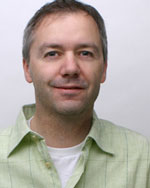
|
After graduating with a PhD in Optical Physics from Aberdeen University, Pete Binfield began his publishing career at Institute of Physics Publishing in Bristol, UK as a Commissioning Editor in their books program. From IoPP, he moved to Kluwer Academic Publishers (KAP) in the Netherlands, where he ran their Major Reference Work program (encyclopedias and handbooks) and then held a variety of positions at KAP, including the management of the Physical Sciences group (Physics, Materials Science, Chemistry) and the directorship of the Plant Sciences and Earth & Environmental Sciences division. KAP merged into Springer Publishers, and during that period he held a position in Business Development, working on projects such as e-books, e-reference works and the Springer Open Choice program. In 2005 he moved to the US to live in California and work for SAGE Publications running their successful US Journals Division (some 220 journals across medical and social sciences). Since April 2008, Peter has been running PLoS ONE, and in September 2009 he also took on overall responsibility for the PLoS Community Journals.
|
|

|
Philip E. Bourne, Ph.D., is a Professor in the Department of Pharmacology and Skaggs School of Pharmacy and Pharmaceutical Sciences at the University of California San Diego, Associate Director of the RCSB Protein Data Bank and an Adjunct Professor at the Burnham Institute. He is a Past President of the International Society for Computational Biology. He is an elected fellow of the American Association for the Advancement of Science (AAAS), the International Society for Computational Biology (ISCB) and the American Medical Informatics Association (AMIA). He is the co-founder and inaugural and current Editor-in-Chief of the open access journal PLoS Computational Biology and a long standing member of the National Science Foundation, National Institutes of Health and Genome Canada panels responsible for reviewing proposals relating to computational biology.
Awards include: the Jim Gray eScience Award (2010), the Benjamin Franklin Award (2009), the Flinders University Convocation Medal for Outstanding Achievement (2004) and the Sun Microsystems Convergence Award (2002).
Bourne's professional interests focus on relevant biological and educational outcomes derived from computation and scholarly communication. This implies algorithms, text mining, machine learning, metalanguages, biological databases, and visualization applied to problems in drug discovery, evolution, cell signaling, apoptosis, systems biology and scientific dissemination. He has published over 200 papers and 5 books, one of which sold over 150,000 copies. He has co-founded 4 companies: ViSoft Inc., Protein Vision Inc., a company distributing independent films for free and most recently SciVee.
Bourne is committed to furthering the free dissemination of science through new models of publishing and better integration and subsequent dissemination of data and results which as far as possible should be freely available to all.
|
|
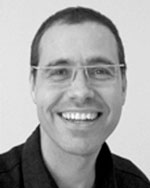
|
Dr. Christoph Bruch is head of Open Access Unit at Max Planck Digital Library. He studied political sciences at Johann Wolfgang Goethe University in Frankfurt am Main and Free University Berlin and wrote his doctoral thesis about the US Federal Freedom of Information Act. Before joining Max Planck Society he held professional positions at the Free University Berlin and the German Institute for Urban Studies. He also worked as freelance consultant advocating access laws and laws regulating direct democracy in Germany. On the international level he was involved in the "UN World Summit on the Information Society" as a representative of the German Civil Liberties Union and temporarily as a member of the German Government delegation. For the ongoing post summit process UNESCO appointed him 'lead moderator' for the topic “Preservation of Scientific Data". He is member of the board or board of trustees of several NGOs, e.g Coalition for Action "Copyright for Education and Research" (www.urheberrechtsbuendnis.de); Foundation "House of Democracy and Human Rights", German Civil Liberties Union, More Democracy.
|
|
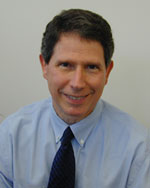
|
Neil S. Buckholtz, Ph.D., is Chief of the Dementias of Aging Branch of the Division of Neuroscience at the National Institute on Aging, National Institutes of Health (NIH), Bethesda, Maryland. This involves overall programmatic responsibility for development, coordination, and implementation of basic and clinical Alzheimer’s disease (AD) research. Specifically Dr. Buckholtz is the program administrator for grants and contracts portfolios including AD drug discovery and development and AD neuroimaging and biomarker research. Dr. Buckholtz holds a doctorate in physiological psychology from the University of Wisconsin, Madison and was a faculty member at the Medical University of South Carolina, Department of Psychiatry, from 1970-1983, before coming to NIH.
|
|

|
Michael Carroll is a Professor of Law and Director of the Program on Information Justice and Intellectual Property at American University Washington College of Law. His research and teaching specialties are intellectual property law and cyberlaw, focusing on the search for balance over time in the face of challenges posed by new technologies. He is a founding member of Creative Commons, Inc., a global organization that provides standardized legal and technical tools that enable legal sharing of cultural, educational, scientific and other copyrighted works.
Professor Carroll also is recognized as a leading advocate for open access over the Internet to the research that appears in scholarly and scientific journals. He has written white papers and has given numerous presentations to university faculty, administrators, and staff around the country on this issue. In addition, he serves on the National Research Council's Board on Research Data and Information, is an Academic Fellow of the Center for Democracy and Technology and is a member of the Advisory Board to Public Knowledge.
Prior to entering law teaching, Professor Carroll practiced law at Wilmer, Cutler & Pickering in Washington, D.C. and served as a law clerk to Judge Judith W. Rogers, U.S. Court of Appeals for the D.C. Circuit and to Judge Joyce Hens Green, U.S. District Court for the District of Columbia. He received his A.B. (Anthropology), with general honors, from the University of Chicago and his J.D., magna cum laude, from the Georgetown University Law Center.using on the search for balance over time in the face of challenges posed by new technologies. He is a founding member of Creative Commons, Inc., a global organization that provides standardized legal and technical tools that enable legal sharing of cultural, educational, scientific and other copyrighted works.
|
|

|
Leslie Chan is Senior Lecturer in the Department of Social Sciences at the University of Toronto Scarborough, where he serves as the Program Supervisor for the International Development Studies program. Since 2000, Leslie has been the Director of Bioline International, a collaborative platform based at CRIA Brazil for open access distribution of research journals from close to twenty developing countries. With Alma Swan, Leslie co-founded the Open Access Scholarly Information Sourcebook (OASIS) and the Global Open Access Map. A Trustee of the Electronic Publishing Trust for Development, Leslie is on the editorial board of Open Medicine and the advisory board of the Scholarly Communication in Africa project funded by the IDRC.
|
|
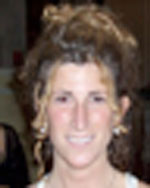
|
Sophia Colamarino is a Consulting Associate Professor in the Department of Psychiatry and Behavioral Sciences at Stanford University Medical School. Sophia joined the non-profit research organization Cure Autism Now in November 2004 as Science Program Director prior to its merger with Autism Speaks, where she remained as Vice President of Research until 2011. During her tenure at Autism Speaks, the world's largest autism science and advocacy organization, she managed Autism Speaks’ Biology Division and developed several important research initiatives, including new efforts in neuropathology, innovative technology and translational biology. She also spent much of her time traveling the country providing science lectures for the autism community. In 2008 Sophia spearheaded the development of an open access policy for publications resulting from Autism Speaks’ funded research, for which she testified to U.S. Congress and has been appointed to the national advisory committee of the NIH's PubMed Central science archive.
Sophia graduated with dual degrees in Biological Sciences and Psychology from Stanford University. She received her PhD in Neurosciences from the University of California, San Francisco, where she studied brain development with neuroscientist Marc Tessier-Lavigne, PhD. After receiving her PhD, Sophia conducted research on the genetic disorder Kallmann Syndrome at the Telethon Institute for Genetics and Medicine in Milan, Italy, led by human geneticist Andrea Ballabio, MD. She then returned to the US to work at the Salk Institute in La Jolla, CA, studying adult neural stem cells and brain regeneration in the laboratory of stem cell pioneer Fred H. Gage, PhD.
|
|

|
Michael M. Crow became the sixteenth president of Arizona State University on July 1, 2002. He is guiding the transformation of ASU into one of the nation’s leading public metropolitan research universities, an institution that combines the highest levels of academic excellence, inclusiveness to a broad demographic, and maximum societal impact—a model he terms the “New American University.” Under his direction the university pursues teaching, research, and creative excellence focused on the major challenges of our time, as well as those central to the quality of life, sustainable development, and economic competitiveness of Arizona and the nation. He has committed the university to sustainability, social embeddedness, and global engagement, and championed initiatives leading to record levels of diversity in the student body.
Under his leadership ASU has established more than a dozen new transdisciplinary schools and large-scale research initiatives such as the Biodesign Institute; Global Institute of Sustainability (GIOS), incorporating the School of Sustainability (SOS); Flexible Display Center; and important initiatives in the humanities and social sciences. During his tenure the university has nearly tripled research expenditures, completed an unprecedented infrastructure expansion, and announced naming gifts endowing the W. P. Carey School of Business; Ira A. Fulton Schools of Engineering; and Mary Lou Fulton Teachers College.
Prior to joining ASU, Dr. Crow was executive vice provost of Columbia University, where he also was professor of science and technology policy in the School of International and Public Affairs. As chief strategist of Columbia’s research enterprise, he led technology and innovation transfer operations, establishing Columbia Innovation Enterprises (renamed Science and Technology Ventures), as well as advancing interdisciplinary program development. He played the lead role in the creation of and served as the founding director of the Earth Institute at Columbia University, and in 1998 founded the Center for Science, Policy, and Outcomes (CSPO), dedicated to linking science and technology to optimal social, economic, and environmental outcomes. In 2003, CSPO was reconstituted at ASU and is now based in both Phoenix and Washington, DC.
A fellow of the National Academy of Public Administration and member of the National Advisory Council on Innovation and Entrepreneurship and Council on Foreign Relations, he is the author of books and articles relating to the design and analysis of knowledge enterprises, technology transfer, sustainable development, and science and technology policy.
|
|
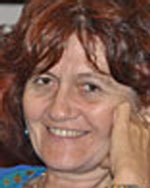
|
An educator in multiple spheres all her life, Associate Professor Laura Czerniewicz has worked in the field of educational technology at the University of Cape Town for over a decade, previously working in publishing in Zimbabwe and South Africa.
The recent Director of the Centre for Educational Technology, she has recently taken up the position of Director of OpenUCT leading the university's initiative to open up its knowledge resources to all with internet connectivity and engage in the broad open education agenda from a Southern perspective.
Her research interests include open education, students'
digitally-mediated practices, digital identities and the field of
learning technology as a scholarly domain.
|
|
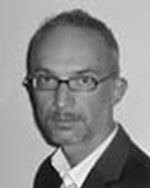
|
Jean-François Dechamp obtained his State Diploma of Doctor of Pharmacy from the University of Strasbourg (France) in 1991. He started his career in the Council of Europe, joined a pharmaceutical company in Italy, and then came to Brussels to work for several pharmaceutical associations in the field of European public affairs. In 2002 he joined the campaign for access to essential medicines of an international humanitarian non-governmental organisation, and later became the director of a patients' group in HIV/AIDS. Jean-François joined the European Commission in 2005. He is a policy officer on open access to research results in the Directorate-General for Research and Innovation.
|
|
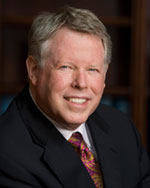
|
Jack E. Dixon, Ph.D., has served as Vice President and Chief Scientific Officer of the Howard Hughes Medical Institute since 2007. He directs HHMI's flagship investigator program, in which leading scientists and their staffs conduct research in HHMI laboratories across the United States. Dixon is also responsible for identifying new opportunities that capitalize on the Institute's expertise in biomedical research and science education.
Prior to joining HHMI, Dixon served as dean of scientific affairs at the University of California, San Diego (UCSD), School of Medicine, where he continues to maintain an active lab. Dixon earned his Ph.D. in chemistry from the University of California, Santa Barbara, in 1971 and has held faculty appoints at Purdue University and the University of Michigan.
A member of the Institute of Medicine and the National Academy of Sciences, Dixon has focused his research efforts on a group of proteins called protein tyrosine phosphatases that govern a key biochemical reaction that serves as a signaling mechanism between living cells. The work has implications for understanding the uncontrolled growth that is characteristic of cancer, the routing of nerve fibers, and the success of disease-causing bacteria and viruses in overcoming the mammalian immune system.
|
|
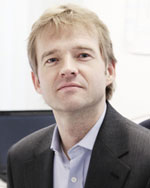
|
Malte Dreyer is the head of Department for Research and Development at Max Planck Digital Library in Munich, Germany. The Department of Research & Development designs and develops software infrastructure and applications in the domain of scientific information for Max Planck Institutes. He is the head of the eSciDoc project to develop an open source eResearch infrastructure and the publication repository PubMan on MPS side.
|
|
|

|
Kathleen Fitzpatrick is Director of Scholarly Communication of the Modern Language Association, and Professor of Media Studies (on leave), Pomona College. She is author of Planned Obsolescence: Publishing, Technology, and the Future of the Academy, published this fall by NYU Press and previously made available for open peer review at MediaCommons Press, and of The Anxiety of Obsolescence: The American Novel in the Age of Television, published in 2006 by Vanderbilt University Press. She is co-founder of the digital scholarly network MediaCommons, and has published articles and notes in journals including the Journal of Electronic Publishing, PMLA, Contemporary Literature, and Cinema Journal.
|
|

|
Stephen Friend is the President of Sage Bionetworks. He was previously Senior Vice President and Franchise Head for Oncology Research at Merck & Co., Inc where he led Merck's cancer research efforts. In 2005, he led the Advances Technologies and Oncology groups to firmly establish molecular profiling activities throughout Merck's laboratories around the world, as well as coordinate oncology programs from Basic Research through phase IIB clinical trials.
Prior to joining Merck, Dr. Friend was recruited by Dr. Leland Hartwell to co-lead the Fred Hutchinson Cancer Research Center's Seattle Project, an advanced institute for drug discovery. While there, Drs. Friend and Hartwell developed a method for examining large patterns of genes that led them to co-found Rosetta Inpharmatics in 2001. Dr. Friend trained with Dr. Robert Weinberg at the Whitehead Institute where he cloned the first cancer susceptibility gene in 1986. Dr. Friend has also held faculty positions at the Dana Farber Cancer Institute Harvard Medical School from 1987 to 1995 and at Massachusetts General Hospital from 1990 to 1995. He received his B.A. in philosophy, his Ph.D. in biochemistry and his M.D. from Indiana University.
|
|

|
Chad Gaffield was appointed president of the Social Sciences and Humanities Research Council of Canada (SSHRC) on September 18, 2006. Gaffield came to SSHRC from the University of Ottawa, where, as a professor of history, he held a University Research Chair and was the founding director of the Institute of Canadian Studies. He is a former president of the Canadian Historical Association and the Canadian Federation for the Humanities and Social Sciences.
An expert on 19th and 20th century Canada, Gaffield has analyzed the ways demographic, economic and cultural changes influence, and are influenced by, institutional and political history. A Fellow of the Royal Society of Canada, he received the society’s J.B. Tyrrell Medal in 2004 for his outstanding contributions to the study of Canada. His most recent award is the Antonio Zampolli Prize presented in June 2011 at Stanford University, and given every three years by the international Alliance of Digital Humanities Organizations for innovative contributions to digital scholarship.
As President of SSHRC, Dr. Gaffield has emphasized the value for the private, public, and non-profit sectors of increasing our knowledge of human thought and behaviour in the past and present in order to create more prosperous, just and resilient societies in the 21st century. In addition to promoting pan-Canadian connections, he is Chair of the International Forum of Funding Agencies and an Executive Board member of the International Social Sciences Council.
Chad Gaffield received his BA and MA from McGill University, and his PhD from the University of Toronto.
|
|
|

|
François Grey is passionate about advancing open science, and specifically citizen cyberscience, which is a collective term for a diverse, grass-roots movement that is enabling ordinary citizens to participate in real scientific research thanks to the Web.
François is a physicist by training, with a background in nanotechnology and a strong interest in science communication. He spent six years at CERN, managing IT communications. In 2004 he initiated and managed the launch of a volunteer computing project called LHC@home. This led to another project called Africa@home, launched in 2005 in collaboration with several academic institutions, NGOs and United Nations agencies.
He is currently based in Beijing, where he is Professor of Distributed Scientific Computing at Tsinghua University, and has helped to launch several citizen cyberscience initiatives in China, including Computing for Clean Water and CAS@home. In 2009, he helped establish a Citizen Cyberscience Centre in Geneva, which is a partnership between CERN, the United Nations Institute for Training and Research and the University of Geneva, and which he currently coordinates. In 2010, he was a recipient of a Shuttleworth Foundation Fellowship for promoting citizen cyberscience in the developing world.
|
|

|
Heather Joseph has served as the Executive Director of the Scholarly Publishing and Academic Resources Coalition (SPARC) since 2005. In that capacity, she works to support broadening access to the results of scholarly research through enabling open access publishing, archiving and policies on a local, national and international level.
Ms. Joseph is also the convener of the Alliance for Taxpayer Access, a coalition of universities, libraries, patients advocacy groups, consumer groups, and student organizations who work to ensure that results of publicly funded research are openly accessible to the public. The group has been a leading voice on U.S. open access legislation, including landmark policy issued by the National Institutes of Health (NIH).
Prior to coming to SPARC, she spent 15 years as a publisher in both commercial and not-for-profit publishing organizations. She served as the publishing director at the American Society for Cell Biology, which became the first journal to commit its full content to the NIH’s pioneering open repository, PubMed Central, and subsequently served on the National Advisory Committee for the project.
Ms. Joseph serves on the Board of Directors of numerous not-for-profit organizations, and recently completed a term as the elected President of the Society for Scholarly Publishing. She is a frequent speaker and writer on scholarly communications in general, and on open access in particular.
|
|
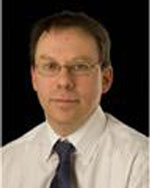
|
Robert Kiley is Head of Digital Services at the Wellcome Library. In this role Robert is responsible for developing and implementing a strategy to deliver electronic services to the Library's users - both in person and remote.
Currently, Robert is taking a leading role in the implementation of the Trust's open access policy and as such is responsible for liaising with publishers with regard to the Trust's OA policy, and overseeing the development of the UK PubMed Central (http://ukpmc.ac.uk) repository. Robert is also acting as Project Manager for the new top-tier, open-access research journal to be launched next year with the support of the Howard Hughes Medical Institute, the Max Planck Society and the Wellcome Trust
Away from open access related activities, Robert is also responsible for developing the infrastructure to supports the Wellcome Library's strategy to provide free, online, universal access to the Library's unique and important collections.
Robert has written a number of books including 'Medical information on the Internet: a guide for health professionals' [Churchill Livingstone, 3rd edn. 2003], 'The Doctor's Guide to the Internet' [RSM, 2001] 'The Patient's Internet Handbook' [RSM 2002] and the 'Nurses Internet Handbook [RSM, 2005].
Robert is a qualified librarian and an Associate Member of CILIP.
|
|
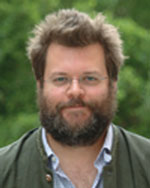
|
Manfred Laubichler is a theoretical biologist and historian of biology working on the interfaces of conceptual and mathematical problems in the life and social sciences and history. He leads a consortium in digital history and philosophy of science that brings together a wide range of projects and is the co-director of ASU-MBL Embryo Project. At ASU he is a professor of life sciences and director of the Center for Social Dynamics and Complexity. He is an adjunct scientist in the MBL Center of Library and Informatics and a Visiting Scholar at the Max Planck Institute for the History of Science.
|
|
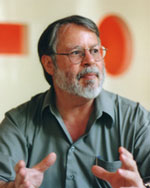
|
Dr. Mark Liberman is the Christopher H. Browne Distinguished Professor of Linguistics at the University of Pennsylvania, where he is also a member of the department of Computer and Information Science and the Psychology graduate group. He is also the director of the Linguistic Data Consortium, which supports language-related education, research and technology development by creating and sharing linguistic resources. The LDC was founded in 1992 with seed money from DARPA, and has played a central role since then in DARPA's use of the "common task method" in speech and language research, whereby formal comparative evaluation and shared training and testing data used to organize and manage R&D programs. Today's technological capabilities in speech recognition, machine translation, and text analytics are largely the result of these DARPA programs. Before moving to Penn in 1990, Liberman was a member of technical staff and head of the Linguistics Research Department at AT&T Bell Labs.
|
|
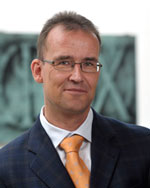
|
Norbert Lossau is the Director of Göttingen State and University Library (SUB Göttingen), Germany. Since 2011 he is also Honorary Professor at the Humboldt-University Berlin/ School of Library and Information Science. Norbert Lossau moved to Göttingen from his post as Library Director and Chief Information Officer (CIO) Scholarly Information at Bielefeld University. In his previous position he has been the first Head of the Oxford Digital Library, University of Oxford, UK.
Norbert Lossau is member of various national and international steering committees and advisory boards, among others the Main Committee for Research Libraries at the German Research Council (Deutsche Forschungsgemeinschaft, DFG), the Working Group “Digital Information in Research and Teaching” of the German Rectors Council (Hochschulrektorenkonferenz, HRK), the German Grid Initiative Advisory Board, the SPARC Europe Executive Board and the European Research Libraries (LIBER) Board. He is the Board Chairman of COAR, the international Confederation of Open Access Repositories. Currently he is also the scientific coordinator of the European project OpenAIRE, implementing the Open Access pilot of the European Commission. At Göttingen University he is a founding Board member of the new “Göttingen Centre for Digital Humanities”, GCDH and a coordinator for campus-wide eResearch and digital research infrastructure concepts.
|
|
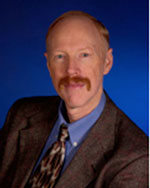
|
Rick Luce is the Vice-Provost and Director of Libraries at Emory University. He was a member of the National Academies Committee on Assuring the Integrity of Research Data in an Era of E-Science, and he has served on three NSF Blue Ribbon panels. Rick is a member of the SPARC advisory board and NSF’s DataONE Advisory Board. He has been a steering board member of the Coalition of Networked Information (CNI) and Executive Board member of the Digital Library Federation. Previously he was the senior advisor to the Max Planck Society's Center for Information Management (2000-2006) and was an executive board member of the National Information Standards Organization (1998-2004).
Prior to joining Emory, Rick was the Research Library Director at Los Alamos National Laboratory (1991-2006), internationally recognized for its pioneering digital library In 2005 he was awarded the Fellows' Prize for Leadership at Los Alamos National Laboratory.
In 1999 Rick was a co-founder of the Open Archives Initiative to develop interoperable standards for author self-archiving systems. In 2003 Rick was a co-organizer of the Berlin Declaration on Open Access to Knowledge in the Sciences and Humanities, and in 2004, the Brazilian Declaration on Open Access.
|
|

|
Elliot E. Maxwell advises public and private sector clients on strategic issues involving the intersection of business, technology, and public policy in the Internet and E-commerce domains. He is a Fellow of the Communications Program at Johns Hopkins University, and Distinguished Research Fellow at the eBusiness Research Center of the Pennsylvania State University. He also advises the Office of the National Coordinator for Health Information Technology in the U.S. Department of Health and Human Services, EPCglobal/GS1 on issues involving radio frequency identification (RFID), and the Committee for Economic Development.
From 1998 until 2001, Maxwell served as Special Advisor for the Digital Economy to U.S. Secretary of Commerce William Daley and U. S. Secretary of Commerce Norm Mineta. In this position he was the principal advisor to the Secretary on the Internet and E-commerce. He coordinated the Commerce Department's efforts to establish a legal framework for electronic commerce, ensure privacy, protect intellectual property, increase Internet security, encourage broadband deployment, expand Internet participation, and analyze the impact of electronic commerce on all aspects of the economy. After leaving the government he was Senior Fellow for the Digital Economy and Director of the Internet Policy Project for the Aspen Institute’s Communications and Society Program.
Previously, Maxwell worked for a number of years as a consultant and as Assistant Vice President for Corporate Strategy at Pacific Telesis Group. He served at the Federal Communications Commission as Special Assistant to the Chairman, Deputy Chief of the Office of Plans and Policy, and Deputy Chief of the Office of Science and Technology. Maxwell also worked for the U.S. Senate as Senior Counsel to the U.S. Senate Select Committee on Intelligence Activities.
Maxwell graduated from Brown and Yale Law School. He has written and spoken widely on issues involving the Internet, electronic commerce, telecommunications, and technology policy. His most recent work, "Harnessing Openness to Improve Research, Teaching and Learning in Higher Education," was issued by the Committee for Economic Development (CED). The predecessors of that work, "Harnessing Openness to Transform American Health Care," "Open Standards, Open Source, and Open Innovation: Harnessing the Benefits of Openness," and "Promoting Innovation and Economic Growth: The Special Problem of Digital Intellectual Property" were also published by CED.
|
|
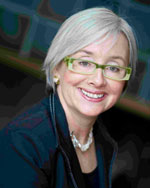
|
Avice A. Meehan has served as Vice President for Communications and Public Affairs at the Howard Hughes Medical Institute since 2002. She is responsible for a portfolio that includes media relations, publications, the HHMI Web site, and support for the Institute’s public access publishing policy. She leads the Institute’s work to inform a wide range of external audiences about HHMI’s work and accomplishments.
Meehan joined HHMI from Memorial Sloan-Kettering Cancer Center in New York, where she served for eight years as vice president, public affairs. A graduate of Mount Holyoke College, Meehan also earned a master's degree from Columbia University Graduate School of Journalism. She started her professional career as a journalist, working for 12 years for newspapers in Massachusetts, Connecticut, and New York.
|
|
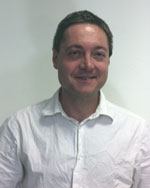
|
Pierre Mounier lectures in the “Digital Humanities” at the École des Hautes Études en Sciences Humaines et Sociales (EHESS) and is associate director of the Center for Open Electronic Publishing (Cléo). He is the editor-in-chief and author of Homo Numericus, a blog focused on digital technologies. He was the Head of the digital publishing service of École Normale Supérieure Lettres et Sciences humaines (2002-2008). A graduate of the École Normale Supérieure in Paris, he has a master’s degree in social anthropology (Université Paris X Nanterre) and a teaching certificate in French literature (Université Paris Sorbonne, Paris IV).
|
|
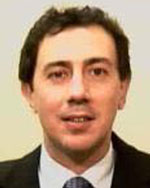
|
Cyril Muller is Vice President of External Affairs at the World Bank. Prior to this, he was Director of the Banking and Debt Management Department for the World Bank Treasury. He joined the World Bank in 1991 as part of the team dedicated to the replenishment of the International Development Association resources (IDA -- the arm of the World Bank that helps the poorest of the developing countries). Mr. Muller has spent most of his World Bank career as an economist and program manager in Eastern Europe, Asia and Africa. In July 2000, he went on external service to take an assignment with the world’s leading company in trade related services where he held the position of Vice President, Products & Strategy. In 2005, Mr. Muller rejoined the World Bank and managed the World Bank's Paris Office for External Affairs. He then served as the Special Representative for Europe from 2008-2010. Mr. Muller is a Swiss national. He is an economist by training with specialization in international trade and finance.He holds degrees in economics from Neuchatel University in Switzerland and from New York University.
|
|
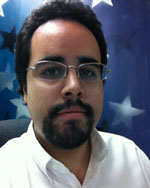
|
Trevor Muñoz is an Assistant Dean for Digital Humanities Research at the University of Maryland Libraries and an Associate Director of the Maryland Institute for Technology in the Humanities (MITH). Trevor holds an MA in Digital Humanities from the Department of Digital Humanities at King's College London and an MS in Library and Information Science with a specialization in Data Curation from the Graduate School of Library and Information Science at the University of Illinois, Urbana-Champaign. He specializes in developing joint research ventures between libraries and digital humanities centers, as well as in research and practice on the curation of humanities data. Trevor is co-editor of a forthcoming open access publication on resources for data curation in the digital humanities and co-organized the first Humanities Data Curation Summit intended to promote the development of a sustainable plan for preserving digital humanities research.
|
|
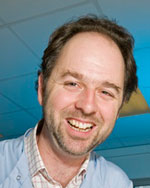
|
Cameron Neylon is a biophysicist who has always worked in interdisciplinary areas and is an advocate of open research practice and improved data management. He currently works as Senior Scientist in Biomolecular Sciences at the ISIS Neutron Scattering facility at the Science and Technology Facilities Council (STFC). Along with his work in structural biology and biophysics his research and writing focuses on the interface of web technology with science and the successful (and unsuccessful) application of generic and specially designed tools in the academic research environment. He is a co-author of the Panton Principles for Open Data in Science, founding Editor in Chief of Open Research Computation, and writes regularly on the social, technical, and policy issues of open research at his blog, Science in the Open.
|
|

|
William Nixon is the Service Development Manager of Enlighten, the University of Glasgow's institutional repository service. He was the Project Manager (Service Development) for the JISC funded DAEDALUS Project that set up repositories at Glasgow using both ePrints and DSpace. William was also a member of the team which drafted the University of Glasgow's Publications Policy, introduced in 2008. He is now involved with the ongoing development of services for Enlighten and support for Open Access at Glasgow. Through the JISC funded Enrich and Enquire projects he has worked to embed the repository into University systems. This work includes links to the research system for funder data and the re-use of publications data in the University's web pages. He was part of the University's team which provided publications data for the UK's Research Excellence Framework (REF) Bibliometrics Pilot. He has been involved in a local REF exercise at Glasgow which used the repository to capture impact and outputs data.
|
|

|
Since the late eighties Cathy Norton has been involved in building the network infrastructure for the laboratory and the electronic library that serves affiliates world wide via high-speed networks. She has served as principal investigator on an Howard Hughes Medical Institute grant for building a virtual library; an Andrew W. Mellon Foundation grant for building taxonomic information services, tools and communities; NIH contract for outreach in Medical Informatics; NOAA and USGS contracts for library services and a Sea Grant for digitizing the Woods Hole herbarium collection. In education, she has developed a paperless course in Medical Informatics that delivers the resources and lectures online for students. Currently she serves as the chair of the digitization committee for the Boston Library Consortium as well as serving on the executive committee. Cathy has also been elected to serve on Members' Council for the Online Computer Library Center and has a 3-year appointment to the Literature Technical Advisory Committee at the National Library of Medicine. She helped form a new consortium of Research Libraries and Museums with Harvard's Museum of Comparative Zoology, New York Botanical Gardens, American Museum of Natural History, Cold Spring Harbors Laboratory, Rockefeller University and the MBLWHOI Library. The MBLWHOI library is vice-chairman of the BioDiversity Heritage Library, a cornerstone of the Encyclopedia of Life, which has a large-scale effort underway to digitize taxonomic literature. She has hosted, lectured, and organized meetings for the NERCOMP Computer Groups and the International Association for Marine Science Libraries and Information Centers. The digital library initiatives have focused Cathy's interests into modernizing the literature using taxonomic name servers and building communities of stakeholders. Her office is physically located in the Archive and Records Management Section of the Laboratory and her interests in this area have grown substantially because of the new standards, laws, and compliance issues surrounding this resource.
|
|
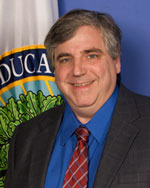
|
Hal Plotkin is the Senior Policy Advisor in the Office of the Under Secretary of Education (OUS), United States Department of Education. The OUS has responsibility for all U.S. federal higher education policies and programs. Prior to his appointment to the Obama administration, Mr. Plotkin was a trustee and board president at the Foothill-De Anza Community College District, based in Silicon Valley, California, where he shared governance responsibility for two community colleges with a combined enrollment of approximately 45,000 students. Mr. Plotkin is an internationally recognized leader in the field of Open Educational Resources, wrote the first article ever published about Creative Commons, and is the author of "Free to Learn" a widely cited governance guide to the use of Open Educational Resources by public higher education institutions. "Free to Learn" is published with an open license that permits free downloading and distribution.
Mr. Plotkin is a writer, editor and media producer by profession who has published more than 600 articles on business, science, technology and education. His publishers include Inc. magazine, Forbes ASAP, Family Business magazine, the San Francisco Chronicle's SFGate.com, and CNBC.com, where he served as Silicon Valley correspondent. He is also a founding editor of the American public radio program "Marketplace" and the creator of the non-profit Center for Media Change, Inc., which facilitates public financing of high-quality print and documentary journalism.
At the Department of Education, Mr. Plotkin is responsible for providing advice and leadership aimed at accomplishing President Obama's graduation goal, which is designed to ensure that the United States will once again have the best prepared, most highly educated workforce in the world by 2020.
Mr. Plotkin is a graduate of Foothill Community College in Los Altos Hills, California and San Jose State University with majors in History and Behavioral Sciences, respectively. He is the first graduate of Foothill Community College to ever serve on its governing board of trustees.
|
|
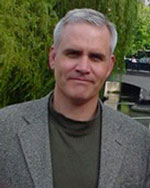
|
Dean Rehberger is the Director of MATRIX: the Center for Humane Art, Letters, and Social Science Online and also Associate Professor of Writing, Rhetoric and American Cultures. His primary areas of research include: information design and architecture; digital libraries, museums and archives; Internet technologies in the classroom; and hybrid learning environments. He overseas the development of a number of open access projects in the humanities including the Quilt Index, Overcoming Apartheid, Studs Terkel: Conversations with America and many other project.
|
|
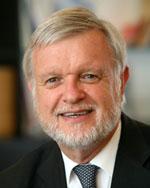
|
Dr. Bernard Rentier was born in Liege, Belgium in 1947. He graduated as a Biologist from Liege University (ULg) in 1070 and obtained a doctorate degree in Experimental Biomedical Sciences also at ULg in 1976, working on the structure of the Influenza virus envelope. He took then a 5 years post-doctoral position at the NIH, Bethesda MD, where he worked on the latency of measles virus in nerve cells. In 1981, he returned to ULg where he worked on the latency of varicella-zoster virus. He became successively Professor, Vice-rector and Rector. Since 1997, as Vice-rector in charge of Research and Libraries, he undertook a vast reform, concentrating 28 libraries into 4 and modernising considerably the equipment and management. Since 2005, as Rector, he decided to create an institutional repository (ORBi) with an immediate deposit/open access mandate launched in november 2009 that achieved one of the fasted growth rate worldwide. He has been a strong advocate of OA for many years and has created EOS (EnablingOpenScholarship), an organisation supporting the implementation of OA in universities and research institutions worldwide.
|
|

|
Dr. Carl Rhodes is senior scientific officer at the Howard Hughes Medical Institute. He earned a B.A. in zoology and mathematics from the University of North Carolina at Chapel Hill and a Ph.D. in biology from The Johns Hopkins University. Before joining HHMI in 2000, he was associate dean for graduate programs in biology and biomedical sciences and professor of biochemistry and biology at Stanford University.
Dr. Rhodes manages the HHMI investigator reviews and competitions. He is responsible for matters related to HHMI’s public access policies. Other activities include serving as liaison to the HHMI Bioethics Advisory Board and the HHMI–Wellcome Trust Postdoctoral Exchange Program.
His earlier research focused on the use of single-strand nucleases to map deletions in viral chromosomes and, and with Drs. Peter Rigby, Tom Shenk and Paul Berg, development of the nick translation technique to label DNA probes. Much of his academic work was devoted to teaching and assessment in biochemistry, including development of texts devoted to problem solving and examination writing.
|
|
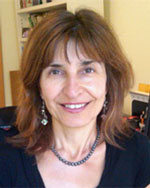
|
Oya Y. Rieger is the associate university librarian for digital scholarship and preservation services at Cornell University Library. She oversees the Library’s digitization, repository development, digital preservation, electronic publishing, and e-scholarship initiatives with a focus on needs assessment, requirements analysis, business modeling, and information policy development. She has leadership in various open access initiatives that have explored and promoted new models of scholarly communication. She oversees arXiv, which is internationally acknowledged as a pioneering open-access distribution service for physics, mathematics, computer science, and related disciplines. Also included in her program area is Project Euclid, which is jointly managed by Cornell University Library and Duke University Press to provide affordable access to high-impact, peer-reviewed mathematics and statistics scholarly materials. Rieger has a B.S. in Economics (METU), an M.S. in Public Administration (University of Oklahoma), and an M.S. in Information Systems (Columbia University). She received her Ph.D. in Human-Computer Interaction from Cornell University.
|
|
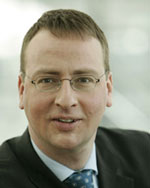
|
Frank Sander is the general manager of the Max Planck Digital Library. He was appointed in this role by the president of the Max Planck Society in 2010. He studied physics in Cologne and Munich and obtained his PhD from the MPI of Quantum Optics under the supervision of Nobel Prize Laureate Prof. Theodor W. Hänsch. Further stages in his career included, among others, assignments with an IT Service Partner in Munich and the management consulting firm McKinsey & Company. Together with three partners, Sander subsequently set up a strategic consulting company specialising in the provision of IT-strategic consulting services to DAX-listed companies. During his six-year stint at this firm, Sander, in his function as a member of the Management Board, was in charge of the areas of IT, law, and finances.
|
|
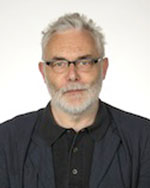
|
Urs Schoepflin is director of the Research Library of the Max Planck Institute for the History of Science. He was a member of the taskforce initiating new directions for electronic information management in the Max Planck Society (MPG). Representing the Institute as a pilot institution, he is now active in workgroups testing and evaluating tools developed with the Max Planck Digital Library. As a digital library specialist, he is a member of the project team of "European Cultural Heritage Online", a pioneering open access infrastructure for working with sources in the humanities. He is involved in the developement of the German Digital Library as a member of the experts group. As director of the Library, he is responsible for the development of the Institute’s computer supported source collection for the history of science, a research environment which makes available digitized microfilmed source material and high-end scans of major printed sources and manuscripts, both held at the Library or provided in cooperation with other libraries or archives, and which are complemented by transcribed XML text. He does research in historical and quantitative aspects of scholarly communication as well as in research evaluation on which he has published several papers. He is active in the International Society for Scientometrics and Informetrics and used to serve as editorial advisor to the journal "Scientometrics".
|
|
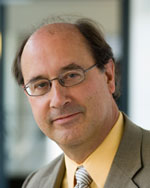
|
Bernard Schutz is a director of the Max Planck Institute for Gravitational Physics (Albert Einstein Institute), where he established and publishes the high-impact open-access review journal Living Reviews in Relativity. There are now five Living Reviews journals in various subjects, and a sixth is about to start. Schutz was one of the organizers of the first Berlin Open Access meeting and was principal organizer of the second and fourth. He chairs the Max Planck Working Group on Open Access and is a member of the editorial board of the new open-access journal Physical Review X.
Schutz's research interests are in the astrophysical applications of Einstein's theory, primarily gravitational waves, black holes, and neutron stars. He is a principal investigator of the GEO600 gravitational wave detector and a founder member of the LISA space-based gravitational wave project. Born in the USA, Schutz received a Ph.D. in physics from the California Institute of Technology, and then spent most of his professional career in Europe. Before helping to found the Albert Einstein Institute in Germany in 1995, he was a Professor of Physics and Astronomy at Cardiff University, Wales, where he still holds a part-time professorship.
Schutz is the author of two widely used graduate-level physics textbooks and a semi-popular book on gravity, and he is co-author of over two hundred research papers. His research led to the Triana software package and to a supercomputer programming environment called Cactus. His outreach work includes the Scienceface series of interviews on black hole physics and astronomy.
He has been elected to a number of honorary academies, is a Fellow of the American Physical Society and he UK Institute of Physics, has been awarded the Amaldi Gold Medal of the Italian Society for Gravitation, and has received the honorary degree of Doctor of Science from Glasgow University.
|
|
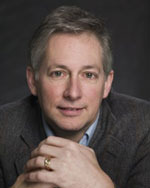
|
Edward Seidel is a physicist recognized for his work on numerical relativity and black holes, as well as in high-performance and grid computing. He earned his Ph.D. from Yale University in relativistic astrophysics. He was a professor at the Max Planck Institute for Gravitational Physics (Albert-Einstein-Institute, or AEI) in Germany from 1996-2003. There, Seidel founded and led AEI's numerical relativity and e-science groups, which became leaders in solving Einstein's equations using large-scale computers, and in distributed and grid computing. He also was a senior research scientist at the National Center for Supercomputing Applications and associate professor in the Physics Department at the University of Illinois, Urbana-Champaign.
In 2003, Louisiana State University recruited Seidel to lead its investment in the Governor's Information Technology Initiative, and he became founding director of LSU's Center for Computation & Technology. Seidel served as CCT director from 2003-2008. Seidel also is the Floating Point Systems Professor in LSU's Departments of Physics & Astronomy and Computer Science. In addition to leading the CCT, he helped initiate, and was the chief scientist for, the $40M Louisiana Optical Network Initiative. He is a recipient of the IEEE Sidney Fernbach Award, the Gordon Bell Prize, and Heinz-Billing Prize, and is a fellow of the American Physical Society.
In June 2008, the National Science Foundation selected Seidel as its director for the Office of Cyberinfrastructure (OCI). He began this position Sept. 1, 2008, in which he oversees advances in supercomputing, high-speed networking, data storage and software development on a national level. He has recently assumed the role of Assistant Director for Mathematics and Physical Sciences at NSF.
|
|
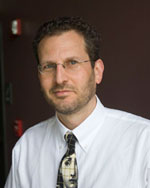
|
Stuart Shieber is James O. Welch, Jr. and Virginia B. Welch Professor of Computer Science in the School of Engineering and Applied Sciences at Harvard University. His primary research field is computational linguistics, the study of human languages from the perspective of computer science. His research contributions have extended beyond that field as well, to theoretical linguistics, natural-language processing, computer-human interaction, automated graphic design, the philosophy of artificial intelligence, computer privacy and security, and computational biology. He is the founding director of the Center for Research on Computation and Society and is the Director of the University Office for Scholarly Communication.
Professor Shieber received an AB in applied mathematics summa cum laude from Harvard College in 1981 and a PhD in computer science from Stanford University in 1989. He was awarded a Presidential Young Investigator award in 1991, and was named a Presidential Faculty Fellow in 1993, one of only thirty in the country in all areas of science and engineering. He has been awarded two honorary chairs: the John L. Loeb Associate Professorship in Natural Sciences in 1993 and the Harvard College Professorship in 2001. He was named a fellow of the American Association for Artificial Intelligence in 2004, and the Benjamin White Whitney Scholar at the Radcliffe Institute for 2006-07.
His work on open access and scholarly communication policy, especially his development of Harvard's open-access policies, led to his appointment as the first director of the university's Office for Scholarly Communication, where he oversees initiatives to open, share, and preserve scholarship.
|
|

|
Dieter Stein is Professor of English Language and Linguistics at Heinrich-Heine-University Düsseldorf (Germany). Dieter Stein obtained degrees (Staatsexamen) in Geography and English at Saarbrücken University (1972) and a PhD in English Linguistics at Saarbrücken (1975). He taught Applied Linguistics and Translation at Heidelberg University (until 1982). After his Habilitation at Aachen (1982) he was appointed professor for English Linguistics (text- and discourse linguistics) at Justus-Liebig-University Gießen and transferred to Heinrich-Heine-University Duesseldorf in 1990, where he has taught since then. He was served in most administrative capacities, including dean and several terms as chairman. He has also taught at various universities in the United States, Canada, Spain and Italy, was invited scholar at UCLA, Berkeley and UBC Vancouver. Publications are on a broad range of topics ranging from the theory of linguistic change, via applied linguistics, the linguistics of discourse, to language and communication in the Internet, the theory of genre and the language of law.
He was President of the International Society if Historical Linguistics, he is currently President of the International Language and Law Society, he is also editor-in-chief of the Linguistic Society of America’s digital Publication Portal “eLanguage”.
He was the organizer and conference director of “Berlin 6” , the Max Planck Open Access conference at Duesseldorf.
Current main research areas: Language of the Law, Computer-Mediated Communication and language development.
|
|
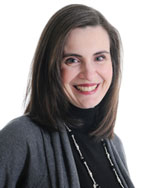
|
Caroline Sutton is one of three Co-founders behind Co-Action Publishing, an international open access publishing house with offices in Scandinavia. In addition to working with marketing, public relations and business development in Co-Action Publishing, Caroline serves as the current President of the Open Access Scholarly Publishers Association (OASPA). She has served on the board of Lund University Library, and is currently a member of the SPARC Europe Board and the Advisory Board of the OpenAccess.se programme in Sweden, and is Chair of the Advisory Board for OAPEN. Caroline speaks regularly on open access issues, and has held a number of workshops, together with Professor David Solomon, for scholar publishers and university libraries on creating and developing open access journals.
|
|

|
Alma Swan is a consultant working in the field of scholarly communication. She is a director of Key Perspectives Ltd and holds honorary academic positions in the University of Southampton School of Electronics & Computer Science and the University of Warwick Business School.
Her work covers market research and business modelling, project management and evaluation, research communication practices and behaviours, and the study and promotion of new forms of scholarly communication in the age of the Web. She writes and makes frequent presentations on scholarly communication issues.Alma has BSc and PhD degrees from the University of Southampton and an MBA from Warwick Business School. She is a Fellow of the Society of Biology and a Chartered Biologist, is an elected member of the Governing Board of Euroscience (the European Association for the Promotion of Science & Technology) and is the former editor of its online magazine, The Euroscientist. |
|
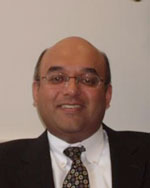 |
Neil Thakur has served as Special Assistant to the National Institutes of Health (NIH) Deputy Director for Extramural Research since 2005. He also serves as program manager for the NIH Public Access Policy, and has spent a year on detail to the US Senate Special Committee on Aging. Prior to his time at NIH, he was Assistant Director of Health Services Research and Development at the Department of Veterans Affairs. Dr. Thakur holds a Ph.D. in Health Policy from Yale University School of Public Health and completed a NIMH postdoctoral fellowship in mental health services research at the Cecil G. Sheps Center for Health Services Research at the University of North Carolina at Chapel Hill.
|
|
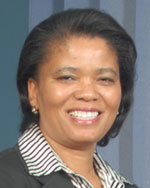 |
Ellen R. Tise is the immediate past President of the International Federation of Library Associations and Institutions (IFLA) 2009-20011 and the Senior Director, Library and Information Services at Stellenbosch University, South Africa. She previously held the position of University Librarian at the University of the Western Cape, Bellville, South Africa, from March 2001 – December 2005. Prior to this, she was Deputy University Librarian (Client Services) at the University of the Witwatersrand, Johannesburg. She also previously held the position of Systems Librarian and other positions at the University of the Western Cape, Brakpan City Library and the University of the Free State in South Africa. She has published various articles in professional journals and is a regular speaker at national and international conferences, seminars, symposia, etc.
|
|
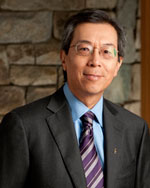
|
Robert Tjian has been president of the Howard Hughes Medical Institute since April 2009. Trained as a biochemist, he has made major contributions to the understanding of how genes work during three decades on the faculty of the University of California, Berkeley. He was named an HHMI investigator in 1987.
Tjian, who remains an active scientist, studies the biochemical steps involved in controlling how genes are turned on and off, key steps in the process of decoding the human genome. He discovered proteins called transcription factors that bind to specific sections of DNA and play a critical role in controlling how genetic information is transcribed and translated into the thousands of biomolecules that keep cells, tissues, and organisms alive.
Tjian received a bachelor's degree in biochemistry from Berkeley in 1971 and a Ph.D. from Harvard University in 1976. After completing a postdoctoral fellowship at the Cold Spring Harbor Laboratory with James Watson, he joined the Berkeley faculty in 1979. At Berkeley, Tjian assumed a variety of leadership roles, including as the Director of the Berkeley Stem Cell Center, and the Faculty Director of the Li Ka Shing Center for Biomedical and Health Sciences. He is a member of the National Academy of Sciences and has received many awards honoring his scientific contributions, including the Alfred P. Sloan Prize from the General Motors Cancer Research Foundation and the Louisa Gross Horwitz Prize from Columbia University. He was named California Scientist of the Year in 1994.
|
|
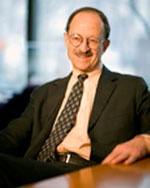
|
Harold Varmus, co-recipient of the Nobel Prize for studies of the genetic basis of cancer, became Director of the National Cancer Institute on July 12, 2010, after 10 years as President of Memorial Sloan-Kettering Cancer Center and six years as Director of the National Institutes of Health. He is a member of the U.S. National Academy of Sciences and the Institute of Medicine and is involved in several initiatives to promote science and health in developing countries. The author of over 350 scientific papers and five books, including a recent memoir titled The Art and Politics of Science, he was a co-chair of President Obama’s Council of Advisors on Science and Technology, was a co-founder and Chairman of the Board of the Public Library of Science, and chaired the Scientific Board of the Gates Foundation Grand Challenges in Global Health.
|
|
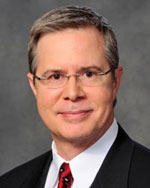
|
Dr. Jeffrey Vitter (M.B.A., Duke University, 2002; Ph.D., Stanford University, 1980; B.S. with highest honors, University of Notre Dame, 1977) is the provost and executive vice chancellor and the Roy A. Roberts Distinguished Professor at the University of Kansas. Previously he was on the faculty at Texas A&M University, where from 2008–2009 he served as provost and executive vice president for academics, with additional responsibilities for the academic mission of Texas A&M University in Doha, Qatar. From 2002–2008, Dr. Vitter served as the Frederick L. Hovde Dean of the College of Science and Professor in the Department of Computer Science at Purdue University. From 1993–2002, Dr. Vitter held a distinguished professorship at Duke University, where he was the Gilbert, Louis, and Edward Lehrman Professor. He served at Duke as chair of the Department of Computer Science from 1993–2001 and as co-director and founding member of the Center for Geometric and Biological Computing. From 1980–1992, he progressed through the faculty ranks and served in leadership roles in the Department of Computer Science at Brown University.
Dr. Vitter serves on the Board of Advisors for the School of Science and Engineering at Tulane University. From 2000–2009 Dr. Vitter served on the Board of Directors of the Computing Research Association (CRA), and he continues to co-chair its Government Affairs Committee. He chaired ACM SIGACT, the Special Interest Group on Algorithms and Computation Theory, of the world's largest computer professional society, the Association for Computing Machinery.
Dr. Vitter is a Fellow of the Guggenheim Foundation, the American Association for the Advancement of Science, the Association for Computing Machinery, and the Institute of Electrical and Electronics Engineers. He was named a National Science Foundation Presidential Young Investigator and is a Fulbright Scholar. He has over 280 book, journal, conference, and patent publications, primarily on the algorithmic aspects of processing massive amounts of information. He is an ISI highly cited researcher with a Google Scholar h-index of 60.
|
|
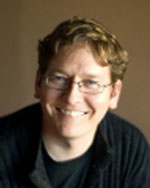
|
John Wilbanks works on open content, open data, and open innovation systems. He is a Senior Fellow at the Kauffman Foundation and a Research Fellow at Lybba. He's worked at Harvard Law School, MIT’s Computer Science and Artificial Intelligence Laboratory, the World Wide Web Consortium, the US House of Representatives, and Creative Commons, as well as starting a bioinformatics company. He sits on the Board of Directors for Sage Bionetworks, iCommons, and 1DegreeBio, and the Advisory Board for Boundless Learning. John holds a degree in philosophy from Tulane University and also studied modern letters at the University of Paris (La Sorbonne).
|




















































